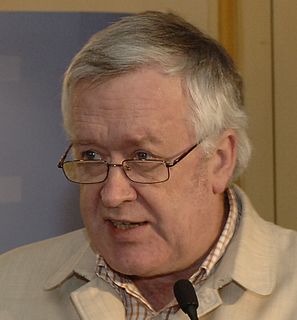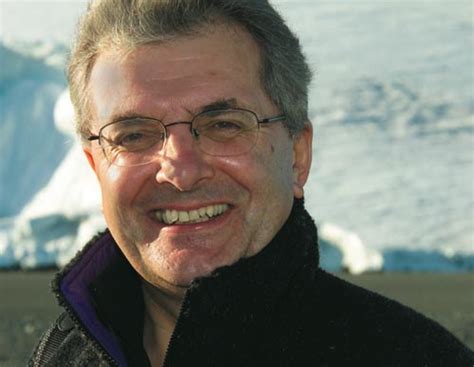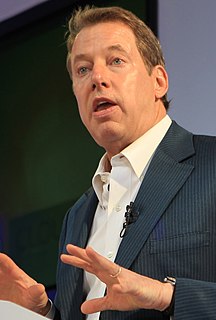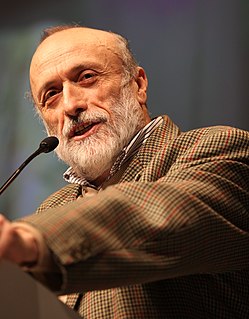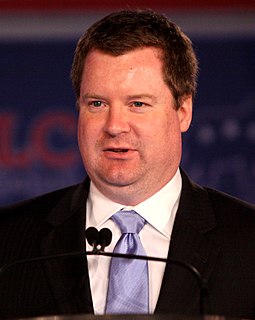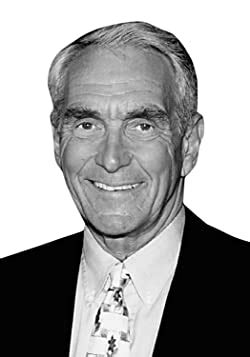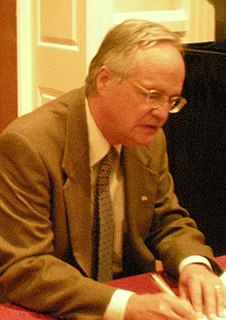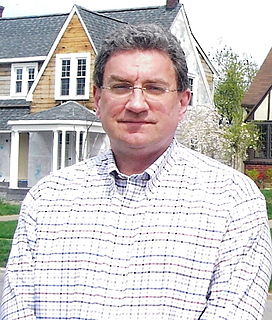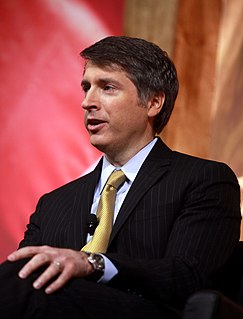Top 432 Emissions Quotes & Sayings - Page 7
Explore popular Emissions quotes.
Last updated on April 16, 2025.
We will pay for this [climate change] one way or another. We will pay to reduce greenhouse-gas emissions today and we'll have to take an enormous hit of some kind. Or we will pay the price later in military terms. And that will involve human lives. There will be a human toll. There is no way out of this that does not have real costs attached to it.
Every day we put another 110 million tons of global warming pollution into the sky as if it's an open sewer, and it's still building up. And the scientists tell us it's a race against time. We've stabilized emissions globally now for the last three years, but they need to start coming down quickly. We've got the momentum, we've got the wind in our sails, we're gonna win this.
Recycling, cutting back on driving, and changing out old light bulbs for energy-efficient ones might save half a ton of carbon a year. A household going car-free, flight-free, and vegan - changes impractical, if not outright impossible, for many families to make - might reduce emissions by four tons a year.
You go into a community and they will vote 80 percent to 20 percent in favor of a tougher Clean Air Act, but if you ask them to devote 20 minutes a year to having their car emissions inspected, they will vote 80 to 20 against it. We are a long way in this country from taking individual responsibility for the environmental problem.
'Scientific' computer simulations predict global warming based on increased greenhouse gas emissions over time. However, without water's contribution taken into account they omit the largest greenhouse gas from their equations. How can such egregious calculation errors be so blatantly ignored? This is why man-made global warming is 'junk' science.
We're talking about should we increase taxes? Why not put a tax on carbon emissions. It would raise a lot of money, it would reduce the environmental damages in the future, it would solve so many problems, and it would be a much more constructive thing to do than to think about raising the income tax.
It is in fact necessary to reduce CO2 emissions. There is no reason why we shouldn't spend our vacations on (the North Sea island of) Sylt instead of in the Seychelles, or drive more economical cars - for the sake of preserving increasingly scarce resources if nothing else. But that won't enable us to stop climate change. As long as China, India and the United States continue the way they have been, what we Germans do is more or less irrelevant.
We want a national emissions trading scheme, the Government does not and has rejected one for years. We want to boost the mandatory renewable energies target, the Government has failed to do that. We want a national demand side management strategy for the country to reduce electricity consumption and the Government, up until now, has done very little on that score.
To reduce modern climate change to one variable, CO2, or a small proportion of one variable - human-induced CO2 - is not science. To try to predict the future based on just one variable (CO2) in extraordinarily complex natural systems is folly. Yet when astronomers have the temerity to show that climate is driven by solar activities rather than CO2 emissions, they are dismissed as dinosaurs undertaking the methods of old-fashioned science.
From wherever the emissions come, they have the same effect: They trap much more heat from the sun, melt the ice, raise the sea level, cause stronger storms, floods, drought, bigger fires, generate millions of climate refugees, destabilize political systems, threaten the growing of food crops and cause a number of other catastrophic consequences which, taken together, threaten the basis for the future of human civilization on the Earth.
The money economy thus leaves a large ecological footprint, defined as the amount of land and resources required to meet a typical consumer's needs. For example, with only about 4% of the world's population, the United States, the largest money economy, consumes in excess of one-quarter of the world's energy and materials and generates in excess of 25 percent of the world's greenhouse gas emissions.
If the relatively rich participating countries want to stabilize atmospheric concentrations of greenhouse gases, they will have to pay at least some poor countries to reduce their emissions. Achievement of substantial reduction in this way implies international transfers of wealth on a scale well beyond anything in recorded history. There is no effective political support for such a Herculean effort, particularly in the United States.
It is impossible to talk about slowing climate change without talking about reducing CO2 emissions. Equally, it is impossible to talk about adapting to climate change without considering how we will feed ourselves. And it is out of the question that we can adapt agriculture without conserving crop diversity.
Although reducing human emissions to the atmosphere is undoubtedly of critical importance, as are any and all measures to reduce the human environmental "footprint", the truth is that the contribution of each individual cannot be reduced to zero... If we believe that the size of the human "footprint" is a serious problem (and there is much evidence for this) then a rational view would be that along with a raft of measures to reduce the footprint per person, the issue of population management must be addressed.
For me the two biggest issues are climate change and animal welfare/animal agriculture. And oddly enough animal agriculture is such a contributor to climate change. According to the United Nations, 25% of climate change comes from animal agriculture, so every car, bus, boat, truck, airplane combined has less CO2 and methane emissions than animal agriculture.
The climate crisis is both the easiest and the hardest issue we have ever faced. The easiest because we know what we must do. We must stop the emissions of greenhouse gases. The hardest because our current economics are still totally dependent on burning fossil fuels, and thereby destroying ecosystems in order to create everlasting economic growth.
We have not done the things that are necessary to lower emissions because those things fundamentally conflict with deregulated capitalism. ... We are stuck because the actions that would give us the best chance of averting catastrophe - and would benefit the vast majority - are extremely threatening to an elite minority that has a stranglehold over our economy, our political process, and most of our major media outlets.
When I'm talking about a developing world, I also look at clean-water access - women who are more vulnerable to sexual violence when they're fetching water. And talking about what we have going on here, with our carbon footprints and our emissions, is just as important to me as figuring out how to provide clean water to people who need it in regions around the world.
First, we must stop wasting energy. A quarter of the UK's carbon emissions come from the home. Our housing stock - the oldest in Europe - is costing us the earth... After transport, heating is the second biggest driver of energy demand in Britain. British Gas research suggests that householders who put in energy efficiency measures cut their gas consumption by 44%. Better insulated buildings will do much of the work for us.
There are many who still do not believe that global warming is a problem at all. And it's no wonder: because they are the targets of a massive and well-organized campaign of disinformation lavishly funded by polluters who are determined to prevent any action to reduce the greenhouse gas emissions that cause global warming out of a fear that their profits might be affected if they had to stop dumping so much pollution into the atmosphere.
I am worried about climate change. In one respect, I may be more worried than other people. I am worried because I have very little confidence that we know what is causing it....One of my fears is that we could reduce carbon emissions by some drastic amount, only to discover that-oops-it turns out that climate change is being caused by something else.
I've been working on a graphic about carbon emissions. It's an incredibly simple graphic - a bunch of blocks and a table below it - but it's taken me three weeks to design. For some reason it just wasn't working. Then finally I realized there was a number present, which I was rendering in each version, that wasn't necessary for the understanding of the piece. This figure was getting in the way and distracting from the main flow of the narrative. As soon as I pulled that graphic out of the design, it sprang into focus. Suddenly it worked.
Politicians all over the world cater to domestic vote banks. They will spend only on what their constituents want. So unless there is a grass root green movement in a nation the politicians will not be willing to spend money on curbing emissions. More awareness is needed amongst the people to effect the real change in how governments spend.
There is not going to be, we can be quite certain, there's not going to be any action on reducing greenhouse gas emissions by China or India or Indonesia or Brazil unless all developed countries are making a major effort. It will still be a big job to get them in, even if we are all making the effort. But our making the effort is a necessary condition.
The climate system is constantly readjusting naturally in a large way - more than we would ever see from CO2. The CO2 kick [impact of CO2 emissions] is extremely small compared to what is happening in a natural way. Within the framework of a proper study of the sun-climate connection, you don't need CO2 to explain anything.
As currently written, the laws require certain manufacturers and users of such chemicals to report any and all environmental releases-either accidental or routine-to air, water, or soil. The Toxics Release Inventory is the main registry of such events, and it is available to the public through the Environmental Protection Agency. It is hardly comprehensive. Toxic emissions reported to the federal government are thought to account for only 5 percent of all chemical releases.
We can no longer completely avoid anthropogenic climate change. At best, limiting the temperature rise to two degrees is just about possible, according to optimistic estimates. That's why we should spend more time talking about adjusting to the inevitable and not about reducing CO2 emissions. We have to take away people's fear of climate change.
If food was no longer obliged to make intercontinental journeys, but stayed part of a system in which it can be consumed over short distances, we would save a lot of energy and carbon dioxide emissions. And just think of what we would save in ecological terms without long-distance transportation, refrigeration, and packaging--which ends up on the garbage dump anyway--and storage, which steals time, space, and vast portions of nature and beauty.
There would be a cost for dumping carbon into our atmosphere and a cap on total emissions. The government must make a clear and firm decision - terminating the idea in our society it is free to pump infinite amounts of carbon into the air. Once that happens, private capital will flow even more aggressively into developing and deploying the alternative, less-polluting technologies.
Some 3 million years ago, when the earth was a little more than 3°C warmer than preindustrial levels (about 2.2°C warmer than today), Antarctica had far less ice and sea levels were a stunning 25 meters higher than today. If we stay on our current emissions path, the planet will almost certainly be that warm by the century's end.
With regard to Banks, they have taken too deep and too wide a root in social transactions, to be got rid of altogether, if that were desirable. They have a hold on public opinion, which alone would make it expedient to aim rather at the improvement, than the suppression of them. As now generally constituted, their advantages whatever they be, are outweighed by the excesses of their paper emissions, and the partialities and corruption with which they are administered.
We know that things like energy independence, getting off oil, getting out of the Middle East, and creating jobs and economic development in the new clean energy industries of the future are much higher priorities for most voters than capping carbon emissions or taxing dirty energy sources. So why not redefine our agenda as the solution to those problems?
We need a firm cap on carbon emissions from fossil fuels. No coal, oil, or gas could enter the economy until the buyer had a permit. All permits would be auctioned by the federal government, and the number of permits auctioned would be decreased by three percent per year. Permits could be traded, but they could not be created out of whole cloth by companies that plant forests or dump iron filings at sea.
Globally, emissions may have to be reduced, the scientists are telling us, by as much as 60% or 70%, with developed countries likely to have to make even bigger cuts if we're going to allow the developing world to have their share of growing industrial prosperity...The Kyoto Protocol is only the first rather modest step. Much, much deeper emission reductions will be needed in future. The political implications are mind-blowing.
The international equity question arises from the costs of climate change itself and mitigation varying greatly across countries. It is affected by the historical responsibility for current greenhouse gas emissions, which countries which were not responsible for what's in the atmosphere now think are very important. Currently rich countries don't think those issues are very important.
...if we all turned down the thermostat in our house by just one degree, we would save over £650 million worth of energy and nearly nine million tonnes of carbon emissions every year. That would be the equivalent of taking three million cars off our roads...we can bring about a Green Consumer Revolution in this country to improve our lives, enrich our economy and protect our environment.
The problem of environmental children's health is very urgent in Russia. Environmental situation now is the main factor, which determines young generation's health... the volume of pollutant emissions in atmosphere and water grew and scale of ecological man-caused catastrophes increased. More than half of Russian territories, where 60-70 percent of the of population lives, have unsafe ecological situation.
The press heralded this as a major accomplishment. The rush from the press as soon as it was announced suggested a high level of coordination. Like lemmings in a staged dive off a cliff, 'historic' became the media's rallying cry. There is nothing historic about the deal. In fact, news reports from November 2012 noted that China expected, in 2012, that its carbon emissions would begin to decline after 2030 because of factory upgrades, efficiencies, etc.
These proven positive consequences of elevated CO2 are infinitely more important than the unsubstantiated predictions of apocalypse that are hypothesized to result from global warming, which itself, may not be occurring from rising atmospheric CO2 levels. The aerial fertilization effect of atmospheric CO2 enrichment is the only aspect of global environmental change about which we can be certain; and to restrict CO2 emissions is to assuredly deny the biosphere the many benefits that accrue from this phenomenon.
The transition from coal, oil, and gas to wind, solar, and geothermal energy is well under way. In the old economy, energy was produced by burning something - oil, coal, or natural gas - leading to the carbon emissions that have come to define our economy. The new energy economy harnesses the energy in wind, the energy coming from the sun, and heat from within the earth itself.
Sustainability is not just about adopting the latest energy-efficient technologies or turning to renewable sources of power. Sustainability is the responsibility of every individual every day. It is about changing our behaviour and mindset to reduce power and water consumption, thereby helping to control emissions and pollution levels.
The European Union and environmental advocacy groups use global warming hysteria to advance their own special agendas. The European Union recognizes any significant reduction in CO2 emissions by the United States will significantly reduce its economic output, thereby bringing it closer to the inferior output of European nations.
Climate change is a crucial issue in todays global agenda. Hopefully, we will wake up to this reality, sooner rather than later. Pressure has been mounting on European Union Member States to act decisively to fight global warming. A bold target has been set reducing carbon dioxide emissions by 20 by 2020.
I think we need to address greenhouse gas emissions. But I try to get involved in issues where I see a legislative result... So I just leave the issue alone because I don't see a way through it, and there are certain fundamentals, for example nuke power, that people on the left will never agree with me on. So why should I waste my time when I know the people on the left are going to reject nuclear power?
Anyone believing the TPP is good for Americans take note: The foreign subsidiaries of U.S.-based corporations could just as easily challenge any U.S. government regulation they claim unfairly diminishes their profits - say, a regulation protecting American consumers from unsafe products or unhealthy foods, investors from fraudulent securities or predatory lending, workers from unsafe working conditions, taxpayers from another bailout of Wall Street, or the environment from toxic emissions.
We have at most ten years - not ten years to decide upon action, but ten years to alter fundamentally the trajectory of global greenhouse emissions... We are near a tipping point, a point of no return, beyond which the built in momentum and feedbacks will carry us to levels of climate change with staggering consequences for humanity and all of the residents of this planet.
My wife and I have purchased two hybrids. We bought a 3 kw photovoltaic unit. We recycle and offset our carbon emissions on the Internet. We turn things off. But we also spend two nice salaries every year, and here's the dirty little secret - our environmental footprint is HUGE, I'm sure. We've all got to do what we can in our individual lives, but we've also got to drive the systemic changes that will make the big differences.
That's why we call for a New Deal prototype. Which means we are creating the jobs - nationally funded program but locally controlled - with guidelines to achieve 100% clean renewable energy through wind, water and sun by 2030. Also to create a sustainable food system, since this is a major portion of climate emissions, and also calling for public transportation as well as infrastructure restoration including in that ecosystem restoration.
It is critical that the world captures every last bit of energy efficiency, if we are to reduce greenhouse gas emissions enough to keep below dangerous rises in temperature. I am pleased that this important new study shows how information and communication technology can play an essential role in saving energy. Now we need more and effective government policies that reward such action and penalize delayed responses.
It's very important that we expand our use of clean energy and make a long-term commitment to it. Biodiesel and ethanol are better for the environment and for the air we breathe. The use of biodiesel is a positive step toward minimizing pollutive emissions and greenhouse gases. By focusing on school buses, we can affect the health and wellbeing of the people most susceptible to that pollution - our children - today.
Joschka Fischer was a Green Party politician and Germany's foreign minister. We hired Mr. Fischer, as well as former US Secretary of State Madeleine Albright, as advisors because we, as an automaker, want to know, for example, how new emissions laws will develop in the United States, Europe and Asia. Fischer and Ms. Albright have diverse contacts worldwide. They can call our attention to trends early on, information from which we can benefit.
I wish we could grow up about it, I'm sure we are contributing to global warming, and we must do all we can to reduce that, but our climate has always changed. The Romans had vineyards in Yorkshire. We're all on this bandwagon of 'Ban the 4x4 in Fulham'. Why didn't we have global warming during the Industrial Revolution? In those days you couldn't have seen across the street for all the carbon emissions and the crap coming out of the chimneys.
The park lies directly downwind from a slew of coal plants. Virtually all of the major contaminants in the local air and water are direct results of coal emissions. Coal produces ozone, which kills trees. Coal produces sulfates, which kill fish. No other park in the country has more ozone or sulfates than Shenandoah National Park.
... the consensus of the scientific community has shifted from skepticism to near-unanimous acceptance of the evidence of an artificial greenhouse effect. Second, while artificial climate change may have some beneficial effects, the odds are we're not going to like it. Third, reducing emissions of greenhouse gases may turn out to be much more practical and affordable than currently assumed.
The horn of dilemma of energy politics is what really drives concern about this energy in this country, at the gut level for most people, is high gas prices. And if you really want to fight global warming and try to reduce our carbon emissions, the cleanest, easiest, most rational way to do it would to make the price of gas even higher through very stiff gas prices.






